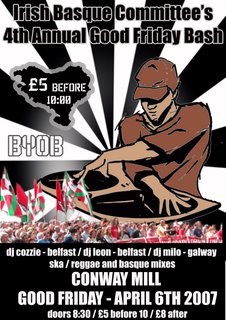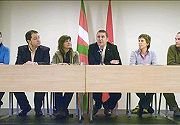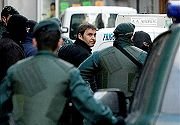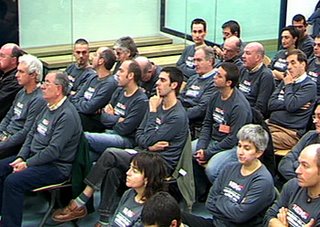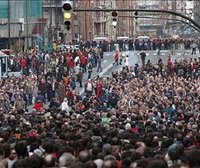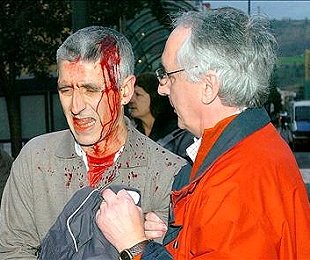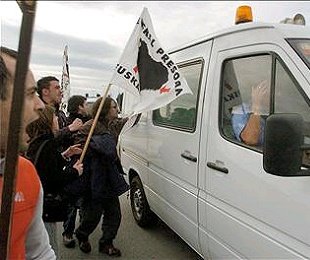 Interview with Arnaldo Otegi
Interview with Arnaldo Otegi Arnaldo Otegi has been interviewed this weekend in Gara and, given the importance of both its words and the political moment; we have decided to reproduce the complete interview. Otegi approaches the necessity of the Basque Country to see the political parties urgently commit with the search of "an agreement that allows the construction of a process that guarantees a final scene of democracy for this country. But he not only raises the necessity to do it, but also the possibility of obtaining it in few weeks". In addition, it approaches other questions of the present time such as the offensive of the PP and the crisis in the PNV.
The political activity of the Basque pro-independence left is in these days is centred in the proposal for the resolution of the conflict that publicly forwarded its negotiating commission the past 7th February. Arnaldo Otegi explains that this proposal "is consequence of an effort made by the Basque pro-independence left to find an agreed and democratic solution to the two knots that feed the conflict: territoriality and right to decide". Arnaldo adds that is a "reasonable proposal that begins in the present situation and concludes in a autonomy framework of four territories that would only take effect if the citizenship of the two communities agreed with it. In addition sets an equality of opportunities scene for all the political projects. That is the solution to definitively overcome the conflict and what is upon the table".
There are those who say that either you accept my project or there is no solution, is blackmail… This it is not our project. Our project is independence and socialism. What we maintain is to overcome the territorial division by means of a process of sum of wills, and that in a Autonomy framework for the four territories a possibility to, in equality of conditions, in peace and in democracy, fulfil all the projects can be materialized if that is the wish of the citizens of this country. That is not our project, that is democracy for this country. Those who say so should explain what is their solution. To maintain the territorial division and a political regime that prevents the materialization of some projects through democratic routes? That is not a solution.
What has been the reaction of the different parties? What we see is that PNV and the PSOE try to get away from the debate of the proposal. To our understanding is because it is so scrupulously democratic that it cannot be attacked. I believe they show nothing but weakness, because on the one hand they say nothing about the proposal and on the other they offer no alternatives, maybe is because do not haveany or because they do not dare to make it public. We do not understand, for example, what problem the PNV has with this proposal.
The Government of Lakua said that it is weaker than Ibarretxe's Plan… I believe that is neither reasonable nor credible to say that the proposal forwarded in the Parliament of Gasteiz for three territories, in the terms in which it was done, surpasses the one just forwarded by the Basque pro-independence left. The PNV made a pact of state in the 77, to manage a three-province territory without the right to decide. In any case, we want to understand that if the PNV believes so about the Basque pro-independence left proposal it will have no problem defending it. We propose a framework for four territories, not a scheme of integration or annexation of Nafarroa. The issue we raise is that the citizenship of Nafarroa, along with the one of the rest of territories, will build a new political framework. We do not suggest a sum of frameworks but a new one.
There are those who think that the PNV could go against it because in an autonomy of four it could lose the power that an autonomy to three has… But I suppose that those who consider ourselves democrats understand that in a framework with democratic game rules everybody aspires to obtain hegemony. The game rules are very simple. Everyone will have to present the citizenship with its project and will be this one who will have to decide it free and democratically. If that decision happens because the PSOE, the PNV or the Basque pro-independence left has the hegemony, it will have to be accepted. We do not have any problem in that and do not think that the PNV has it either.
They publicly say that they are not going to seat with you while ETA violence continues or Batasuna does not distance itself from that violence… The majority population of this country has the desire to begin multilateral political dialogue. In addition, this proposal looks for a reasonable approach to the rest of proposals on the table. On the issue of violence it is necessary to remember that ETA maintains a permanent cease-fire. To say in this situation that there is no will to engage in a dialogue that is to say, that they do not want to resolve this conflict democratically.
Do you think that the proposal will be tackled in the short term? In the next weeks, the political forces, fundamentally those that block the democratic process must show their maximum commitment to approach one first step to be able to inform the Basque society that a process of negotiation and multilateral solid based political dialogue begins and that the objective is to reach a scene in which all the projects are possible.
Which are the forces that block that process of solution? From our point of view the PNV and the PSOE, that neither debate the proposal nor offer alternatives. To explain why they do not want to look for solutions.
I insist, these parties assure that before seating with you to engage in dialogue
certain conditions around violence must be given … We continued considering the methodology proposed in Anoeta valid. It seems that those political formation that do not follow Anoeta are the ones that refuse to develop the political dialogue. On the issue of ETA, what they have to do is to speak with ETA. But the blockade and the unfreezing of the process is an issue to be tackled by the parties' board. The political parties cannot wait any longer to close a commitment in our area of responsibility, which is to solve the conflict in political terms. And it is necessary to do it urgently, in the following weeks. At the moment the priority lies on the unblocking of the process at an integral and global way. With regard to the parties' responsibility, this country needs with urgency an agreement that will allow the construction of a process that will guarantee a final democracy scene for this country. It is necessary to do it urgently. If there is political will it is possible to be do it in the following weeks. That is what we are facing in this conjuncture.
Soon it will be a year since ETA announced permanent cease-fire. What valuation do you do of this period? We have lived constant spaces of both ambiguity and the lack of commitment that have generated, instead of positives, continuous negative scenes. There are two elements that have been constant in these twelve months: the structural repression against the Basque pro-independence left and the lack of commitment to start a multilateral political dialogue. That is what causes a convulsive process. As opposed to that, the Basque pro-independence left bids to build a stable process, of mutual agreement and with guarantees for all the parts involved. That is what we are trying to build with the proposal forwarded by the negotiating commission. We pretend to stabilize our track, which at the same time stabilizes the process in global and integral terms.
Your latest comment that the State has no political price to pay either to ETA or Batasuna has brought about loads of attention, what do you mean by it? Is very simple: that the Spanish State does not have a problem with ETA or Batasuna. At the most it will have a part of the problem. It has a problem with the Basque Country, that majority and democratically it demands to be recognized, that its right to decide and to vertebrate its territory be respected. For that reason, the State does not have to pay a political price to the Basque pro-independence left, must respect the agreement reached by the political forces of the Basque Country to resolve the conflict in democratic terms.
And do you think that taking into account the current behaviour of the PP towards Zapatero he can take or guarantee new steps? We always have demanded historical ambition. The scenes that we are seeing remind us of the 1977 and 1978. They are practically same scenes, with the difference that in the 77 there was transition led by the pro-Franco sectors - political and biological parents of the PP- and therefore it was a non-democratic transition, that imposed to our country the territorial partition and the lack of decision making capacity, now there is the opportunity to carry out the democratic transition that was not done in the 1977. That happens through the recognition of the national rights of the peoples that are within the Spanish State. That is the open opportunity now. That should be done with the participation of the PP, but the problem is that this party is not in positions of democratic right but of extreme right.
Some sectors consider that, having in mind the harassment that Zapatero undergoes, the Basque pro-independence left should do something to facilitated things… Without entering that scheme, it is necessary to remember that the Basque pro-independence left forwarded the Anoeta proposal, that ETA maintains a permanent cease-fire, that we are willing to speak in any condition and that we just presented another proposal - that is not our political project - that allows a democratic and agreed solution. That is to say, we have put on the table the definitive solution to the conflict and the conditions that make it possible can already be obtained. That is why to do it is so urgent. It is necessary to take that step, which is a task of historical dimensions. The PP is trying to deeply sabotage this change that could solve the problems that the pro-Franco reform did not resolve. It thinks that this way will be able to maintain the manipulated the pro-Franco reform and to win the elections.
Speaking of elections, which are practically around the corner, what is the Basque pro-independence left going to do? The Basque pro-independence left is going to present itself. Firstly, we also have institutional fight vocation. We were born as popular unity to carry out among other things the institutional fight. We are not a formation that he wants to be outside the institutions, we also want to be an alternative in the institutions. Secondly, we are going present ourselves because from the institutions it is also possible to deepened in the process of solutions and, thirdly, because if we are not in the next elections those elections will not be democratic.
Are you thinking about legalizing some acronym or another formula? We insist on our vocation and right to be in the elections, and that right must be respected. The resolution process needs to have the Basque pro-independence left in the elections , how can it be a process otherwise?
